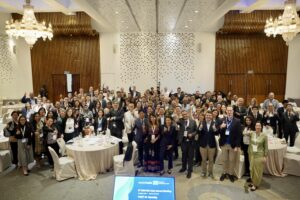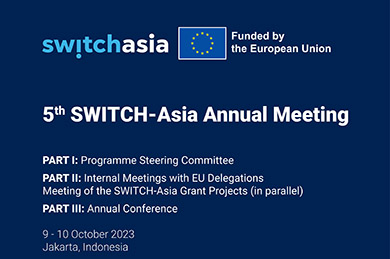Jakarta, October 11, 2023 – With a 15-year track record of fostering sustainable consumption and production (SCP) in Asia through its SWITCH-Asia programme, the EU aims to drive the transition towards an inclusive green and circular economy, promoting more sustainable consumption and production patterns.
The SWITCH-Asia Programme’s Steering Committee Meeting and 5th Annual Conference, organised by the Policy Support Component, took place on October 9th and 10th, 2023, at Le Méridien Hotel in Jakarta, Indonesia. The event convened 140 representatives, both offline and online, from ongoing grant-funded projects in Asia, Central Asia, Mongolia and China, government officials from the 42 eligible countries, and select regional organisations, partners, and experts specialising in SCP across sectors.
On October 10th, delegates from Central Asia, South Asia, Southeast Asia, Mongolia, China, and the Pacific collectively explored regional SCP and circular economy trends and priorities. They identified opportunities and strategies for joint initiatives under the Policy Support Component framework, focusing on circular economy transformation in building and construction, resource use, climate change, and agri-food systems.
Building on the success of its 140 projects, with 33 currently in implementation, SWITCH-Asia plans to continue funding consortia comprising EU-Asian organisations. The programme aims to amplify its impact by fostering the replication and scaling-up of project results, alongside facilitating access to finance and public-private investments for green products, services, and technologies in the region.

Background
SWITCH-Asia is a programme funded by the European Union (EU). Active since 2007, it seeks to promote Sustainable Consumption and Production (SCP) in the region. Through its 2019 EU Green Deal and Global Gateway, the EU has further committed to supporting the transition of countries to a low-carbon, resource-efficient and circular economy. This has also strengthened the knowledge basis and momentum of the programme in supporting Asian countries’ SCP commitments as part of SDG 12 and the Paris Agreement.
The programme consists of two components:
The Grant Component
Managed by the Directorate-General for International Partnerships of the European Commission, this component targets micro, small and medium sized enterprises (MSMEs). They are addressed through business organisations, research institutes and universities, and NGOs and consumer organisations willing to test and adopt more sustainable production and consumption processes, and improve the sustainability of their products.
Under this scheme, partnerships are established involving both organisations from the EU and from the region. The goal of this component is to facilitate the replication of sustainable production and consumption practices in MSMEs in the region. One hundred forty three projects were funded in the Asian region over a period of 15 years, implemented by consortia of Asian and European organisations.
The Policy Support Component (PSC)
The PSC provides direct support to regional organisations, national governments and related implementing agencies in charge of policies and regulatory frameworks relevant to SCP. This is done in the form of on-demand advisory on scaling up SCP policy and implementation as well as through creating a platform for knowledge exchange, and building capacities of regional institutions. All activities rely on the strong engagement of partner countries and organisations in co-creating the requested policies, processes and other deliverables. Projects by the SWITCH-Asia PSC benefit several governments at once through a multi-country or regional approach. Managed by the EU Directorate General International Partnerships (DG INTPA), the PSC’s activities are implemented by GOPA and NIRAS.

